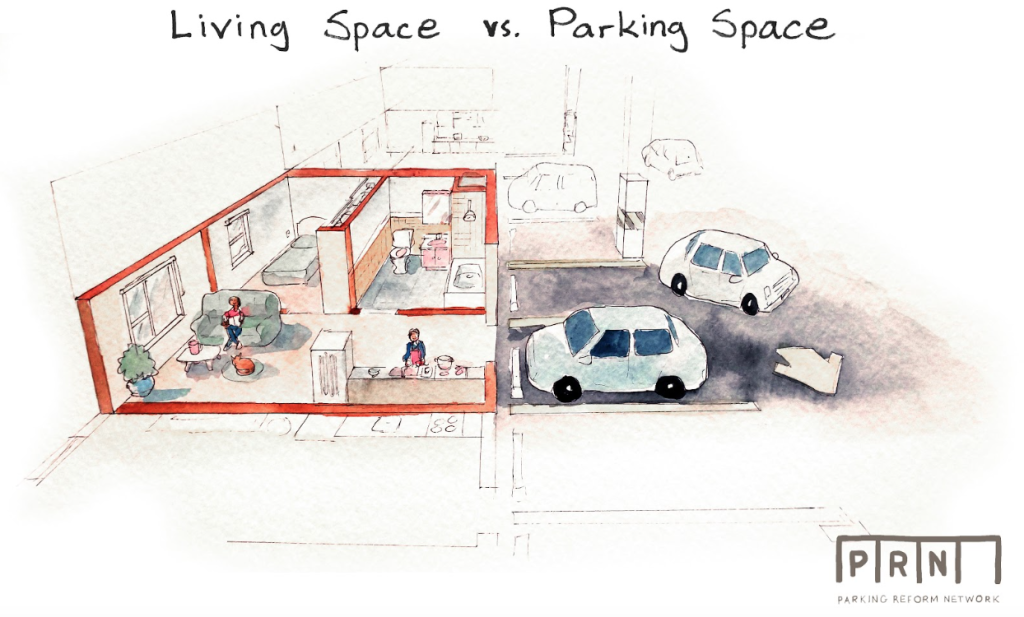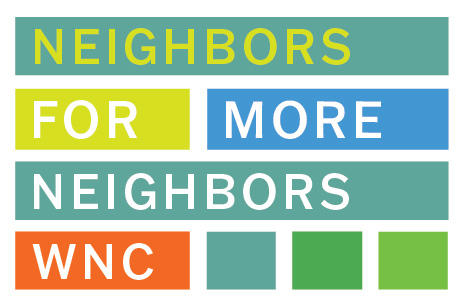Our region is experiencing a housing shortage. Our communities don’t have enough homes available to rent or buy at the price points that residents and their families can afford.
MountainTrue and Neighbors for More Neighbors WNC support the removal of parking mandates because it’s time to prioritize more homes at more attainable prices for the people who live and work here over mandates for unnecessary parking.
So, what are parking mandates, how could reforming them make our communities better, and what does parking have to do with housing?
Parking mandates are rules about how much parking must be built when new homes or businesses are constructed. Want to open a bowling alley? You’ll need a certain number of parking spaces per lane. Want to build a home? You’ll need at least 1–2 parking spaces per apartment or home.
To comply, these spaces will need to be “off-street,” meaning they are in a parking lot, driveway, or garage. These rules have led to a situation where we have plenty of parking spots (over 2 billion nationwide*), and not nearly enough homes locally and nationally.
Cities and towns across the South are re-evaluating their parking mandates, with places like Gastonia, NC and Dunwoody, GA eliminating them completely. Without these onerous regulations, there are no rules that dictate how many spaces must be built for what type of home or business, allowing homeowners, housing developers, and business owners to decide how many spots to build based on the location, access to transit, bike lanes and walking paths, and the needs of future residents or customers.
Let’s get the facts straight.
- Parking costs money to build. The price can vary, but the general consensus is that it can cost anywhere between $5,000 and $50,000* to build a single parking space, depending on whether that spot is in your garage at home, in a surface lot, or a parking garage.
- Parking is always paid for by the end user. Homeowners, renters, and customers at local businesses end up paying for “free” parking – it’s just hidden in the cost of goods and services, new construction, or their rents.
- Cities across the country are rethinking – and removing – parking mandates. From Anchorage, AK to Gainesville, FL, and from Austin, TX to Raleigh, NC, these cities (and many others) have removed parking mandates citywide.

So, what’s the connection between parking and housing?
- Parking spots take up physical space that could be used for homes. Especially in a mountainous region like ours, there is limited availability of land suitable for development and we need to be particularly efficient with how we use that land. Vacant lots in our towns and cities could be used for homes, but in many instances, the added requirement of parking spaces can make homes infeasible due to physical space constraints, particularly for the smaller vacant lots closer to the city center.
- Parking spots are expensive – which increases housing costs for renters and home buyers. The cost of parking is passed along to the tenant by increasing the rent, regardless of whether they own a car or not. For renters, the cost for parking is, on average, an extra $225 per month* – regardless of whether you own a car or not. For homeowners, the cost of a garage can add $18,000 to a home. Removing parking mandates means the developer can build fewer spots and charge per spot rather than bundling the costs together, allowing tenants to choose whether or not to rent a spot.
- Removing parking mandates is particularly helpful for affordable housing. Studies from Colorado* show that more than half of low-income households who live near transit do not own a vehicle. Meanwhile, high parking mandates mean fewer affordable homes will be built due to physical space constraints and scarce subsidy dollars that make every penny count. Removing parking mandates creates more affordable homes for working class and low-income families. That’s because without parking mandates, affordable apartments can add more homes without triggering requirements to add expensive or infeasible parking spots.
It is clear from examining these studies, facts, and figures that parking requirements can make housing more difficult to build and more expensive. Cities across the country are re-examining parking mandates to help address their housing needs, and tackle other challenges like transit ridership, climate change, and community connectedness. In our next blog post, we’ll dive into the after effects from several cities that have removed parking mandates, and draw lessons about what this policy change could mean for cities and towns in our region.
Questions? Contact MountainTrue Housing & Transportation Director Susan Bean (susan@mountaintrue.org).
